________________
अध्याय- १
The soul-jiva, the non-soul - ajīva, influx - asrava, bondage - bandha, stoppage - samvara, gradual dissociation - nirjarā, and liberation - mokṣa, constitute the reality (tattva).
The soul (jiva) is characterized by consciousness (cetană). Consciousness has knowledge (jñāna), etc., as its signs. The non-soul (ajiva) has characteristics opposite to the soul (jiva). The inflow of auspicious (subha) and inauspicious (aśubha) karmic matter into the soul is influx (asrava). The intermingling in the same space-points (pradeśa) of the soul and the karmas is bondage (bandha). The blockage of influx (āsrava) of karmic matter into the soul is stoppage (samvara). Separation or falling off of a part of karmic matter from the soul is dissociation (nirjarā). The complete annihilation of all karmic matter bound with the soul is liberation (mokṣa). These are described in detail later on. The soul (jiva) is mentioned first in the sūtra as all fruits are experienced by it. The non-soul (ajīva) is mentioned next as it is of service to the soul (jiva). Influx (asrava) is mentioned next as it concerns both the soul (jiva) and the non-soul (ajiva). Bondage (bandha) comes next as it follows influx (asrava). As there is no bondage for one who is well shielded, hence stoppage (samvara) is the opposite of bondage (bandha); stoppage, therefore, is mentioned next to bondage. Dissociation (nirjarā) takes place after stoppage (samvara) and hence it is mentioned next. As liberation (mokşa) is the final outcome, it is mentioned last.
Merit (punya) and demerit (papa) must be included in the sutra as some learned commentators have spoken of nine categories. No, it is not necessary; these - merit (punya) and demerit (pāpa) - are implied in influx (asrava) and bondage (bandha). But then the mention of influx (asrava), etc., is also unnecessary as these are included in the soul (jiva) and the non-soul (ajiva). No, it is not unnecessary. Liberation (mokṣa) is the main theme of the work so these must be mentioned. Liberation (mokṣa) is preceded by the cycle of births and
9




